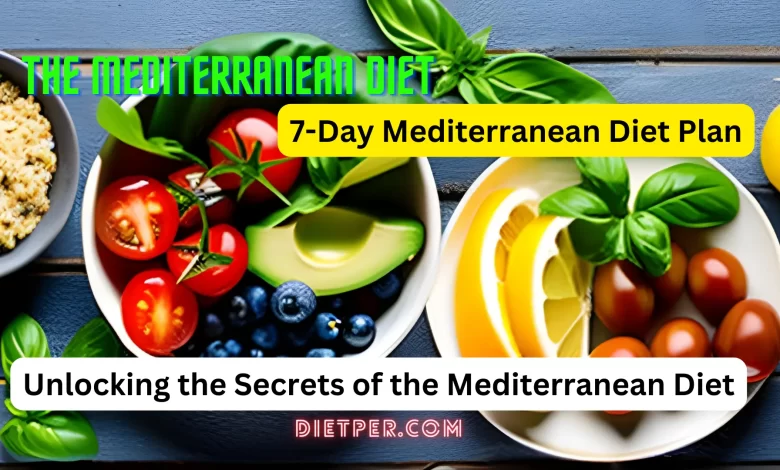Mediterranean Diet: A Delicious Path to Health and Longevity
The future of the Mediterranean Diet: Its potential impact on public health and sustainability

Mediterranean Diet : Nutritionists and health experts have praised the Mediterranean Diet for its numerous health benefits. This diet is based on the standard foods and cooking styles of countries that touch the Mediterranean Sea, such as Greece, Italy, Spain, and Turkey. The Mediterranean Diet is not only delicious but also emphasizes whole, natural foods that provide a wealth of nutrients, including healthy fats, fiber, and antioxidants.
What is the Mediterranean Diet?
The Mediterranean diet has gained widespread recognition for its numerous health benefits and delicious culinary traditions. Originating from the lands surrounding the Mediterranean Sea, this dietary pattern is characterized by abundant fresh fruits, vegetables, whole grains, legumes, lean proteins, and healthy fats. It is a way of eating that emphasizes a balanced and varied intake of nutrient-dense foods while promoting enjoyment and social engagement around meals.
The Mediterranean diet’s core is the consumption of plant-based foods, like fruits, vegetables, nuts, and whole grains. These components provide a rich array of vitamins, minerals, and antioxidants, all contributing to overall health and well-being.
Mediterranean Diet Benefit
Inspired by the traditional eating patterns of countries surrounding the Mediterranean Sea, the Mediterranean diet has offered numerous health benefits. Let’s explore some of the key benefit of adopting the Mediterranean Diet.
- Heart Health
One of the biggest benefits of the Mediterranean Diet is its positive impact on cardiovascular health. Studies have shown that following this eating pattern can lower the risk of heart disease, lower cholesterol levels, and decrease blood pressure. The diet emphasizes whole grains, fruits, vegetables, legumes, and healthy fats like olive oil while limiting processed foods, red meat, and sugary treats.
- Weight Management
The Mediterranean Diet is not solely focused on weight loss but is associated with maintaining a healthy weight. This balanced and nutrient-dense diet emphasizes portion control and includes lean proteins, healthy fats, and high-fiber foods that can help you feel satisfied and maintain healthy body weight.
- Reduced Risk of Chronic Diseases
In addition to heart health, the Mediterranean Diet has been linked to a reduced risk of other chronic diseases, including type 2 diabetes, certain types of cancer, and neurodegenerative conditions like Alzheimer’s. This diet’s abundance of antioxidants, anti-inflammatory compounds, and fiber-rich foods contribute to its protective effects.
- Improved Brain Health
The Mediterranean Diet is beneficial for the body and the brain. Research suggests that this way of eating may help enhance cognitive function and reduce the risk of cognitive decline and dementia. Fish, nuts, fresh fruits, and vegetables, rich in omega-3 fatty acids and antioxidants, support brain health.
- Longevity
People living in regions where the Mediterranean Diet is traditionally followed tend to have longer lifespans. Combining a nutrient-rich diet, regular physical activity, and a strong sense of community and social engagement contributes to overall well-being and longevity.
Most Popular Blogs :
- The Spartan Agoge Diet: Fueling the Warrior Spirit
- Bland Diet Foods : Delicious and Healthy bland foods today
- The Ketovore Diet: Exploring the Perfect Fusion of Keto and Carnivore
Why is the Mediterranean Diet better for me?
Originating from the Mediterranean region, this dietary pattern is based on the standard eating habits of countries like Greece, Italy, and Spain. What sets it apart and makes it so beneficial is its emphasis on whole, unprocessed foods and the inclusion of healthy fats, lean proteins, and various fruits and vegetables.
- Heart-healthy nature
Numerous studies have shown that tracking this eating pattern can reduce the risk of heart disease, lower cholesterol levels, and improve general cardiovascular health. This is mainly attributed to the high intake of mono-un-saturated fats found in olive oil, nuts, and seeds, which help to reduce inflammation and improve blood vessel function.
- lower risk of chronic diseases
The Mediterranean Diet is associated with a lower risk of chronic diseases such as obesity, type 2 diabetes, and certain types of cancer. The emphasis on plant-based foods, lean proteins (such as fish and poultry), and limited red meat and processed foods contribute to a well-balanced and nutrient-dense diet. The abundance of fiber, vitamins, and minerals in these foods nourishes the body and supports overall health.
- For lifestyle
Regular physical activity, socializing over meals, and savoring the flavors of fresh, seasonal ingredients are all integral parts of this eating pattern. This holistic approach promotes a positive relationship with food and encourages mindful eating practices, leading to better digestion, improved satisfaction, and a healthier mindset toward food.
What does the Mediterranean Diet plan?
Rooted in the traditional eating habits of Mediterranean countries like Greece, Italy, and Spain, this diet plan offers a delicious and nutritious approach to eating.
The Mediterranean Diet emphasizes consuming whole foods rich in nutrients while encouraging a shift away from processed and unhealthy options. The diet centers on plant-based foods such as fruits, vegetables, whole grains, legumes, and nuts. These ingredients are not only packed with essential vitamins and minerals, but they are also excellent sources of fiber and antioxidants.
Another critical part of the Mediterranean Diet is the inclusion of healthy fats, particularly from sources such as olive oil, avocados, and fatty fish like salmon. These fats provide essential omega-3 fatty acids known for their heart-healthy benefits. In contrast to many other diets, the Mediterranean Diet also incorporates moderate amounts of dairy products, such as yogurt and cheese.
Additionally, it allows for the consumption of lean meats and poultry, though in smaller quantities and less frequently compared to the typical Western diet. The Mediterranean Diet is not just about the foods you eat but also how you eat them. It encourages mindful and enjoyable dining experiences, emphasizing the importance of communicating meals with loved ones and savoring every bite. This approach to eating promotes a healthy relationship with food and fosters a sense of community.
Research has shown that the Mediterranean Diet can have a range of positive effects on overall health, including reducing the risk of heart disease, promoting brain health, and aiding in weight management. By following this diet plan, individuals can enjoy various flavorful and satisfying meals while reaping the benefits of a healthier lifestyle.
How do I start a Mediterranean Diet?
Starting a Mediterranean diet may initially seem overwhelming, but with a few easy steps, you can easily incorporate this healthy and delicious eating method into your daily routine. Here’s how to get started on a Mediterranean diet:
- Embrace plant-based foods: The Mediterranean diet centers around fruits, vegetables, whole grains, legumes, and nuts. Make sure to include a wide variety of colorful fruits and vegetables in your meals.
- Choose healthy fats: The Mediterranean diet encourages the consumption of healthy fats like olive oil, avocados, and olives. These fats are rich in monounsaturated fatty acids that have been shown to promote heart health.
- Prioritize seafood and lean proteins: Seafood, especially fatty fish like salmon, sardines, and mackerel, is a staple in the Mediterranean diet. Packed with omega-3 fatty acids, seafood provides numerous health benefits. Additionally, include moderate portions of lean proteins like poultry, eggs, and dairy products like Greek yogurt and cheese.
- Limit red meat and processed foods: While the Mediterranean diet allows for the occasional consumption of red meat, it is advisable to limit it and choose lean cuts when you do indulge. Processed foods high in added sugars, refined grains, and unhealthy fats should also be avoided or consumed in moderation.
- Enjoy fresh herbs and spices: The Mediterranean region is known for its flavorful dishes, often achieved through fresh herbs and aromatic spices. Experiment with herbs like basil, rosemary, oregano, and spices like cumin, turmeric, and paprika to enhance the taste of your meals without relying on excessive salt.
- Savor meals with family and friends: Besides the food, the Mediterranean diet emphasizes the importance of enjoying meals with loved ones. Take time to savor your food, engage in meaningful conversations, and create a positive and mindful eating environment.

7-Day Mediterranean Diet Plan
If you’re ready to embark on a healthier lifestyle, here is a comprehensive 7-day Mediterranean diet plan to help you get started.
Day 1
- Begin your day with a wholesome breakfast of Greek yogurt topped with fresh berries and a sprinkle of nuts.
- For lunch, enjoy a colorful salad loaded with mixed greens, cherry tomatoes, cucumbers, olives, and feta cheese, dressed with olive oil and lemon juice.
- For dinner, savor a grilled lemon herb chicken breast accompanied by roasted vegetables and a side of quinoa.
Day 2
- Start your morning with a delightful omelet with spinach, tomatoes, and feta cheese.
- At lunchtime, relish a whole wheat pita stuffed with hummus, sliced cucumbers, tomatoes, and grilled chicken.
- For dinner, indulge in a delicious baked salmon fillet seasoned with herbs and lemon, served alongside steamed asparagus and whole grain couscous.
Day 3
- Energize your day with Mediterranean-style avocado toast topped with sliced tomatoes and a drizzle of extra virgin olive oil.
- For lunch, enjoy a Mediterranean grain bowl comprising cooked farro, chickpeas, diced cucumbers, cherry tomatoes, and crumbled feta cheese.
- For dinner, delight in a plate of whole-grain spaghetti tossed with sautéed garlic, cherry tomatoes, fresh basil, and a sprinkle of grated Parmesan cheese.
Day 4
- Kickstart your morning with a bowl of overnight oats made with rolled oats, almond milk, chia seeds, and a handful of mixed berries.
- At lunchtime, savor a Greek salad wrap filled with crisp lettuce, sliced cucumbers, tomatoes, Kalamata olives, feta cheese, and a drizzle of tzatziki sauce.
- Relish a grilled vegetable kebab and a serving of whole wheat couscous for dinner.
Day 5
- Enjoy a delightful breakfast of whole-grain toast topped with mashed avocado, sliced tomatoes, and a sprinkle of feta cheese.
- For lunch, savor a Mediterranean-style lentil soup packed with vegetables and fragrant herbs.
- For dinner, indulge in a baked chicken thigh marinated in a mixture of lemon juice, garlic, and oregano, served alongside roasted potatoes and steamed green beans.
Day 6
- Start your day with a classic Mediterranean breakfast of a boiled egg, whole-grain bread, and a variety of sliced vegetables like cucumbers, bell peppers, and cherry tomatoes.
- Relish a traditional Greek moussaka made with layers of eggplant, ground lamb or beef, tomato sauce, and a creamy béchamel topping for lunch.
- Enjoy a grilled shrimp and vegetable skewer and a serving of quinoa salad for dinner.
Day 7
- End your week with a satisfying breakfast of whole-grain pancakes topped with Greek yogurt and a medley of fresh fruits.
- For lunch, savor a caprese salad featuring juicy tomatoes, fresh mozzarella cheese, and basil leaves drizzled with balsamic glaze.
- For dinner, relish a baked white fish fillet seasoned with Mediterranean spices, served alongside sautéed spinach and bulgur pilaf.
Mediterranean diet recipes
Mediterranean Diet Recipes for a Healthy and Flavorful Lifestyle Embracing the Mediterranean diet is a great way to improve your overall health and an opportunity to indulge in delicious and nutritious meals. The Mediterranean recipe is renowned for its emphasis on fresh fruits, vegetables, whole grains, legumes, and lean proteins; all brought together with a liberal use of heart-healthy olive oil. If you’re eager to explore the diverse and mouthwatering world of Mediterranean cuisine, here are a few easy Mediterranean recipes to get you started:
- Greek Salad with Grilled Chicken: This vibrant salad combines crisp lettuce, juicy tomatoes, cucumbers, red onion, and tangy Kalamata olives. It’s a satisfying and wholesome meal, topped with succulent grilled chicken, crumbled feta cheese, and a zesty lemon and oregano dressing.
- Mediterranean Quinoa Bowl: Packed with protein, fiber, and a medley of Mediterranean flavors, this quinoa bowl is a delightful choice for a quick and nutritious lunch. Toss cooked quinoa with cherry tomatoes, diced cucumber, chopped fresh herbs like parsley and mint, crumbled feta cheese, and a squeezing of lemon juice. Add grilled shrimp or chickpeas for an extra protein boost.
- Moroccan Chickpea Stew: Transport yourself to the exotic flavors of Morocco with this aromatic and hearty stew. This stew is simmered to perfection in a rich tomato-based broth by combining chickpeas, sweet potatoes, carrots, and a blend of warm spices like cumin, cinnamon, and paprika. Serve it over couscous for a filling and satisfying meal.
- Greek Yogurt Parfait: End your Mediterranean feast on a sweet note with a refreshing and nutritious Greek yogurt parfait. Layer creamy Greek yogurt with fresh berries, a drizzle of honey, and crunchy granola or chopped nuts. It’s a guilt-free indulgence that will leave you feeling satisfied.
Review Mediterranean Diet
“The Mediterranean Diet has been a life-changer for me! Not only have I lost weight, but I feel more energized and healthier than ever before. The emphasis on fresh fruits, vegetables, and olive oil has made a noticeable difference in my skin and overall well-being. It’s a sustainable and enjoyable way to eat, and I’m never returning to my old habits!” – Anna S.
“I started the Mediterranean Diet to improve my heart health and couldn’t be happier with the results. My cholesterol levels have dropped, and I feel more confident about my long-term health. The variety of delicious foods and flavors excites me about mealtime, and I’ve discovered a love for cooking with fresh ingredients. It’s not just a diet; it’s a lifestyle that I’m proud to embrace.” – Mark D.
“The Mediterranean Diet has helped me make peace with food and my body. It’s not about deprivation or strict rules but rather celebrating wholesome and nourishing choices. I’ve learned to savor every bite, and the natural weight loss has been a fantastic bonus. I now enjoy regular exercise, and the Mediterranean Diet has become a key part of my self-care routine. It’s truly a transformative way of eating!” – Emily R.
“I was initially skeptical, but the Mediterranean Diet has exceeded my expectations. It’s incredibly easy to follow, and the meals are tasty and satisfying. I’ve noticed a significant improvement in my digestion and overall digestion. The focus on healthy fats has been surprisingly effective in curbing my cravings, and I feel more in control of my eating habits. I’m grateful for this positive change in my life!” – Tom W.
FAQS
Can the Mediterranean Diet be vegetarian?
Yes, The Mediterranean Diet can be adjusted to a vegetarian lifestyle by emphasizing plant-based foods like fruits, vegetables, legumes, nuts, seeds, and whole grains.
Can the Mediterranean Diet be gluten-free?
Yes, the Mediterranean Diet can be gluten-free by choosing naturally gluten-free grains like rice, quinoa, and corn and avoiding gluten-containing foods like wheat, barley, and rye.
Can I use regular olive oil instead of extra virgin olive oil?
Yes, regular olive oil can be used instead of extra virgin olive oil, but keep in mind that extra virgin olive oil has more health benefits and a richer flavor.
Can I eat pizza on the Mediterranean Diet?
Occasionally, yes. Opt for a Mediterranean-inspired pizza with whole grain crust, olive oil, plenty of vegetables, and moderate amounts of cheese.
Can I eat foods from non-Mediterranean cultures?
Yes, the Mediterranean Diet encourages diversity and includes incorporating healthy foods and cooking styles from other cultures.
How does lifestyle relate to the Mediterranean Diet?
The Mediterranean Diet is not only about food but also emphasizes an active lifestyle, social engagement, and stress reduction, which are all important aspects of the Mediterranean way of living.
When was the Mediterranean Diet created?
The Mediterranean Diet has been practiced for centuries, but its popularity as a recognized dietary pattern for health emerged in the 1960s with the work of Ancel Keys and other researchers.
What are the foods you avoid during the Mediterranean diet?
The Mediterranean diet discourages or limits processed foods, sugary snacks, refined grains, and unhealthy fats like trans fats.
What are the primary foods in a Mediterranean diet?
The main foods in a Mediterranean diet include fruits, vegetables, whole grains, legumes, nuts, seeds, olive oil, fish, and moderate amounts of dairy and poultry.
What is Mediterranean diet meal plan?
A Mediterranean diet meal plan typically includes a variety of fruits, vegetables, whole grains, legumes, nuts, seeds, fish, and olive oil as the primary source of fat.
Mediterranean diet recipes for dinner?
- Mediterranean grilled shrimp skewers with a side of quinoa and a Greek salad.
- Baked cod with lemon and herbs served with roasted vegetables and couscous.
Mediterranean diet on a budget (Reddit)?
For budget-friendly Mediterranean diet ideas, consider shopping for seasonal fruits and vegetables, buying whole grains and legumes in bulk, and choosing affordable protein sources like canned tuna or frozen fish.
What are the best two Recipe for Mediterranean diet ?
Mediterranean diet dinner recipes for two:
- Baked chicken with Mediterranean spices and a side of roasted sweet potatoes and broccoli.
- Pasta with cherry tomatoes, olives, spinach, and feta cheese.
Conclusion
The Mediterranean Diet has been hailed as one of the world’s healthiest and most sustainable eating patterns. With its emphasis on fresh fruits and vegetables, whole grains, legumes, lean proteins, and healthy fats, this dietary approach has been linked to numerous health benefits, including reduced risk of heart disease, stroke, and certain types of cancer.
As we look towards the future, it is crucial to recognize the potential of the Mediterranean Diet in transforming our health and the planet’s health. By embracing this dietary pattern, individuals can improve their well-being and contribute to a more sustainable and resilient food system for generations to come.

Disclaimer
This blog post aims to empower (Dietper) you to make informed and health-conscious food choices. Your well-being is of paramount importance, and it’s essential to prioritize your health before embarking on any restrictive diets. Therefore, if you have any concerns, it is highly advisable to seek guidance from a healthcare professional or registered dietitian before making dietary changes.




